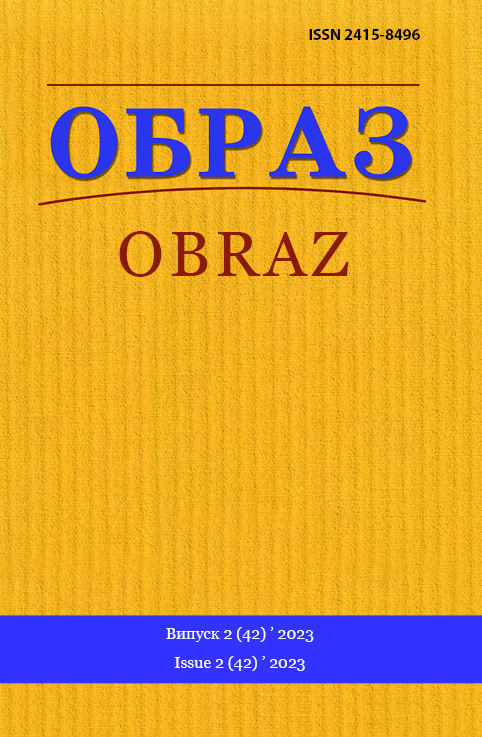Abstract
Introduction. In the conditions of the full-scale invasion of the aggressor country on the territory of Ukraine, the advertising and PR communication of brands has undergone significant changes. One of the main adaptive changes in the communication discourse of brands has become situational communication – the ability to quickly react to events in the information environment and create relevant, viral content, in particular, through the product name and packaging design.
Relevance of research. In view of this, it is relevant to investigate the structure of the creation of situational pragmatonyms and point out the appropriateness of the created product name. The purpose of the article is to investigate the manifestations of the patriotic position of the brand through the situational change of pragmatonyms of food products, to single out the factors that encourage brands to rename products, and the feasibility of changing packaging for the complex impact of verbal and non-verbal components as elements of semiotic formation.
Research methods. During the research, general scientific methods and techniques of generalization, comparison, and systematization were involved, which were used to distinguish the changed pragmatonyms of food products during the period of the full-scale russian invasion.
The results. Changes in the pragmatonyms of food products as a reaction to the full-scale russian invasion were initiated by one brand within its products and supported by all manufacturers at the Ukrainian Research Institute of Standardization initiative. In view of the negative associations with the aggressor country, it was decided to abandon the name of standardized sausage products “Moscow sausage” and cheese “Russian cheese”, which have the recipe and appearance determined by DSTU. Brands independently chose the names for this type of sausage and cheese, mostly formed pragmatonyms fit into the lexical-semantic field of the concept “Ukraine”.
Conclusions. The situational change of the name of the product caused by the russian military aggression is one of the ways for the brand to demonstrate its patriotic position, support the Ukrainian military and distance itself from the symbols of the enemy country. However, we note that not all situational wartime pragmatonyms are appropriate, some brands speculate on the topic of war, which causes public outrage. Due to such trends, the product naming process should be regulated by law, which is now reflected in the draft law.
References
1. Bachynska, G. (2017), “Phonetic and lexical-semantic features of pragonyms: on the material of confectionery products”, Naukovi Zapysky Ternopilskoho Natsionalnoho Pedahohichnoho Universytetu im. Volodymyra Hnatiuka. Ser. Movoznavstvo [The Scientific Issues of Ternopil Volodymyr Hnatiuk National Pedagogical University. Ser. Linguistics],vol. 2 (27), pp. 22–26.
2. Vinarieva, О.V. (2005), Structural, Semantic and Pragmatic Aspects of English-language Trade Names (on the Material of Internet Websites), Abstract of the PhD diss, Kyiv, 20 p.
3. Hrushevska, Yu. A. (2022), “The role of pragmatonyms in advertising text”, in Kivalov, S. V. (Ed.), The European choice of Ukraine, the development of science and national security in the realities of large-scale military aggression and global challenges of the 21st century (to the 25th anniversary of the National University «Odesa Law Academy» and the 175th anniversary of the Odessa School of Law), Odesa, June 17, 2022, vol. 1, pр. 845–847.
4. DSTU 4427:2005 (2007), Sausages, Raw-smoked and Raw-dried. General Technical Requirements, Kyiv, 27 p., available at: http://ksv.do.am/GOST/DSTY_ALL/DSTY2/dsty_4427- 2005.pdf (accessed: 27 June 2023).
5. DSTU 4591:2006 (2007), Boiled and Smoked Sausages. General Technical Requirements, Kyiv, 16 p., available at: http://ksv.do.am/GOST/DSTY_ALL/DSTY2/dsty_4591-2006.pdf (accessed: 27 June 2023).
6. Lishchenko, Yu. (2022), “Instead of «Moscow», it became «Banderivska»”, Vysokyi Zamok [High Castle], 23 November, available at: https://wz.lviv.ua/ukraine/477912-zamist-moskovskoistala-banderivskoiu (accessed: 27 June 2023).
7. «Molokia» joined the Courage trend (2022), available at: https://sostav.ua/publication/molokya-pri-dnalas-do-trendu-sm-livost-92384.html (accessed: 27 June 2023).
8. The name of «Moskovska» sausage will be changed in DSTU (2022), available at: https:// agrotimes.ua/tvarinnitstvo/nazvu-kovbasy-moskovska-zminyat-u-dstu/ (accessed: 27 June 2023).
9. Opanasenko, O. (2022), “«ZSU» sausage: manufacturers commented on the name, which outraged the network”, Glavkom [Commander in Chief], available at: https://glavcom.ua/country/ society/kovbasa-zsu-virobniki-prokomentuvali-nazvu-jaka-oburila-merezhu-917005.html (accessed: 27 June 2023).
10. Draft Law on Amendments to Certain Laws of Ukraine on Limiting the Use of Patriotic Themes in Trademark Registration and Advertising (2022), available at: https://itd.rada.gov.ua/billInfo/Bills/ Card/41592 (accessed: 27 June 2023).
11. Slobodianiuk, E. (2017), Treasure for a Copywriter. The Technology of Creating Exciting Texts, Folio, Harkiv, 224 p.
12. Sukhanova, V. S., Kotsiuba, A. Yu. (2019), “Pragmatonyms in the onomastic space”, Naukovyi Visnyk Mizhnarodnoho Humanitarnoho Universytetu. Ser.: Filolohiia [International Humanitarian University Herald. Philology], vol. 43, no. 5, pp. 142–144.
13. Tielietov, О.S., Shatova, V.М. (2014), “Packaging as an object of innovative marketing”, Marketynh i Menedzhment Innovatsii [Marketing and Management of Innovations], vol. 2, pр. 11–20.
14. Torchynskii, M.M. (2008), The Structure of the Nominal Space of the Ukrainian Language: a monograph, Avist, Khmelnytskyi, 550 p.
15. Yanchyshyn, А.М. (2017), “Proper names of industrial goods: essence, typology, differential features”, Studia Slawistyczne: Etnolingwistyka i Komunikacja Międzykulturowa, Wydawnictwo KUL, Lublin, P. 301–313.

This work is licensed under a Creative Commons Attribution 4.0 International License.

